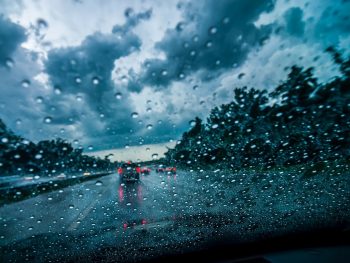Lower motorway speed limits in wet weather could save lives, say drivers
UK motorway speed limits should be cut to as low as 50mph in wet weather to help save lives, according to drivers.

78% of those who support lower motorway speed limits in the wet said it would encourage some drivers to slow down, while 72% believed it might save lives
Nearly three-quarters (72%) would like to see the standard 70mph speed limit on motorways reduced in wet conditions, as already done in France.
Among the 2,100 drivers surveyed, a third (33%) said the limit should be reduced to 60mph in the wet, while 7% think it should be cut to 65mph. But 17% of drivers would like an even lower limit of 55mph or even 50mph. The other 14% weren’t sure how much the speed limit should be cut by.
Drivers were particularly convinced of the safety benefits such a move would have. Of those who support lower motorway speed limits in the wet, 78% said they felt lower limits would encourage some drivers to slow down, while 72% believed it might save lives. Two-thirds (65%) said slower speeds might improve visibility with less spray from moving vehicles, and half (53%) felt it would reduce overall vehicle speeds, even if some people ignored the lower limit.
Official figures back the safety merits of such a move. Of the 806 people killed or seriously injured on motorways in Great Britain in 2019, around a 30% of these casualties (246) occurred when the road surface was damp, wet or flooded – up from 208 four years earlier (208). Official figures also show that wet roads and drivers travelling too fast for the conditions were respectively the cause of some 259 and 242 motorway collisions in 2018.
However, a fifth of drivers (21%) were against the idea of a lower motorway speed limit in bad weather. Of this, the majority (54%) said it was because most drivers already adjust their speed to the conditions, or because there would be difficulty in defining when the new limit should apply (60%). But 42% said many drivers choose to ignore existing speed limits anyway and a similar proportion (41%) thought drivers wouldn’t obey a lower motorway limit.
RAC data insight spokesman Rod Dennis said: “While most drivers already adjust their speed when the weather turns unpleasant, figures show that ‘driving too fast for the conditions’ and ‘slippery roads’ are still among the top 10 reasons for motorway collisions and contribute to significant numbers of serious injuries and even deaths every year.
“The overall success of any scheme would of course depend on sufficient numbers of motorists reducing their speed, but even just a proportion reducing their speed in the wet would be likely to improve the safety of the UK’s motorways.”
And while Dennis said there would be a number of practical hurdles to be overcome for any such scheme, he added: “It’s worth remembering that an increasing number of stretches of motorway no longer have permanent 70mph limits, as all smart motorways feature speed limits which are automatically adjusted to ease congestion based on traffic flow. With digital signs now so commonplace, arguably the means exist to conduct a trial to see whether there are safety benefits of setting different speed limits in inclement weather.”












